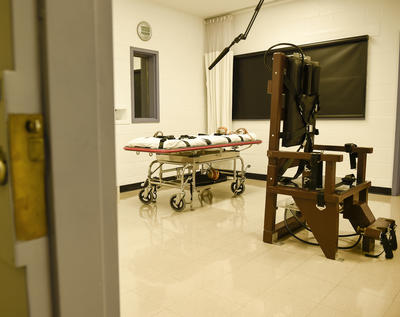
Oscar Smith was not killed by the state of Tennessee as planned Thursday night.
Gov. Bill Lee granted Smith a temporary reprieve barely an hour before the execution was scheduled to take place, citing “an oversight in preparation for lethal injection.” The governor said in a statement that the execution would be postponed “while we address Tennessee Department of Correction protocol.”
Smith would have been the first person executed in the state since before the COVID-19 pandemic and the third put to death by lethal injection in the past decade.
Tennessee executed seven people between 2018 and 2020 after a nine-year hiatus, but many of them opted for the electric chair out of fear that lethal injection would have been even more painful. Lethal injection is the default method in the state, but people sentenced for crimes committed before 1999 may also choose death by electrocution.
Smith was so concerned about Tennessee’s lethal injection protocols that his attorneys said he would rather be killed by firing squad. In a motion filed earlier this month, they noted that the “torturous effects” of the three-drug protocol can last an average of more than 13 minutes, which they said would violate his eighth amendment protection from cruel and unusual punishment.
“This Court has previously found that the current three-drug protocol is sure or very likely to cause serious illness and needless suffering,” they wrote.
Prison officials deferred all questions about the reprieve to the governor’s office, which could not immediately provide more details about their decision.
Smith’s defense team wants an independent investigation. They also want all other executions to be put on hold in the meantime. The next execution is scheduled for May 10, with five others set for later in the year.
“We have been very concerned about the ways in which the department has acquired the drugs and concerned about the ways that they’ve been stored. We’re very glad that governor is trying to ensure that there’s some transparency and that there will be checking of this whole process,” attorney Amy Harwell says. “It’s a really important thing that the public be aware of how this is done, since this is done in all of our names.”
Harwell and Smith were taking communion in the death watch chamber when prison employees broke the news that his life had been spared, at least temporarily. She says her client “visibly slumped with relief.”
“It was so not what I was expecting to hear, that some part of my brain thought it was a macabre joke,” Harwell says. “But I knew from the looks on their faces they were very serious.”
Harwell says Smith and his spiritual adviser said a prayer of thanksgiving before he was taken back to his unit, where he is expected to stay until at least June 1.
Pending concerns about innocence
Smith’s attorneys have filed multiple motions in recent days asking the courts to reopen his case, citing new evidence they say could prove his innocence.
The 72-year-old was sentenced to death in 1990 for killing his estranged wife, Judith Lynn Smith, and her two sons from another relationship, Chad and Jason Burnett. Smith had allegedly been violent with them in the past and threatened to kill them on more than one occasion.
His lawyers say that he has always maintained his innocence and that a recent forensic analysis located another person’s DNA on the weapon that was supposedly used in the murder. Multiple courts have denied their request to consider the evidence.
Now that his execution has been postponed, Smith’s attorneys say they will continue to litigate his case.

